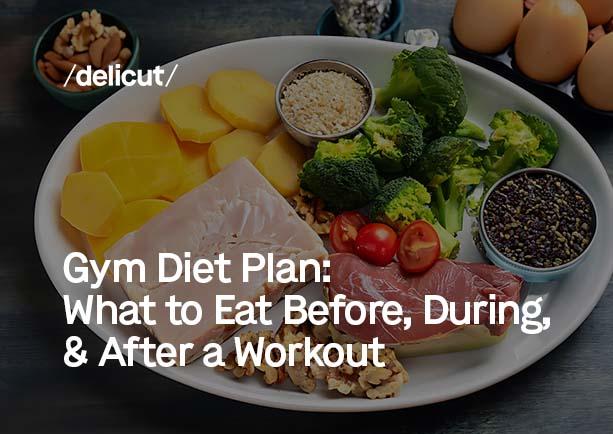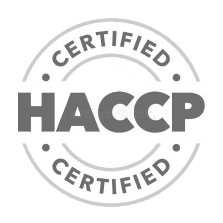Gym Diet Plan: What to Eat Before, During, & After a Workout

If you exercise regularly, it's vital to ensure you consume sufficient energy to maximize the advantages of your physical endeavors. Whether you're a dedicated athlete amid training, a daily gym enthusiast, or someone who holds intense workouts primarily on weekends, monitoring your nutritional intake and how you nourish your body before, during, and after each exercise session remains crucial.
Maintaining a well-balanced diet and making thoughtful snack choices can effectively sustain your energy levels during your exercise sessions. You can achieve your fitness goals with a customized workout diet plan that fuels and supports your workouts. In this blog, we dive into understanding the basics of nutrition that help chalk out an ideal diet plan for your workout.
Pre-workout Nutrition for Optimum Performance
If your last meal was two or more hours ago, it's a good idea to refuel before a demanding workout, especially if you exercise in the morning or between meals. Eating a small amount of carbohydrates (about 15 to 25 grams) can boost your energy and help preserve muscle. The longer the gap between your meal and your workout, the more balanced your meal should be, including carbs, fats, and proteins.
For a substantial meal, aim to eat three to four hours before exercise. Two hours before, opt for a carb-rich snack. Right before your workout, consider a small, easily digestible carb snack like half a banana or some crackers. Keep these pre-workout snacks low in fat and fiber for quick digestion. If you need a heartier snack, try crackers with hummus or yogurt.
Refilling Your Energy During Workout
Particularly beneficial for extended workout sessions, the intake of carbohydrates can contribute to sustaining your stamina and preserving your focus and timing. This becomes crucial when engaging in training or activities surpassing the 60 to 90-minute mark and intermittent sports such as soccer, basketball, or tennis.
Additional snack alternatives to consider while active surround a handful of jelly beans or gummy bears, a tablespoon of honey, or sports gels. (Aim for 15 to 25 grams of carbohydrates during halftime or up to 90 grams per hour during endurance undertakings like marathons or long-distance cycling.) A modest quantity of protein before or during training for weightlifting regimens could support muscle development and help enhance your health with a balanced workout diet.
Significance of a Post-Workout Meal
Consuming a snack or meal rich in protein and carbohydrates immediately post-workout refuels your body's expended energy and facilitates muscle repair and growth. In addition to taking the edge off your hunger, having a quick snack right after your session allows you time to cool down, shower, change, and prepare for a complete meal.
Within the recovery window, which spans up to an hour following your workout, prioritize meals that include sufficient protein, carbohydrates, and overall caloric intake. Foods containing the essential amino acid leucine, such as dairy products, aid the body in synthesizing muscle protein. Maximize your efforts with a targeted diet for effective gym workouts.
Stay Hydrated
Maintaining proper hydration throughout your workout is equally essential as ensuring adequate nutrition. When determining your hydration needs, consider various factors, such as the duration of your exercise session and the prevailing temperature. As you exercise, experts commonly recommend consuming fluid every 15 to 20 minutes, four to eight ounces. The precise amount varies based on the intensity of your workout and your perspiration rate.
For many individuals engaged in physical activity, water proves to be the optimal choice for staying hydrated. Nonetheless, if your workout is demanding or extends beyond 90 minutes, sports drinks can offer electrolytes like sodium, which aids in maintaining fluid balance, and carbohydrates that help sustain energy levels and delay the onset of fatigue.
Conclusion
Preparing a well-balanced gym diet plan that encompasses the crucial pre-workout, during-workout, and post-workout nutritional components is a pivotal step toward optimizing your exercise routine. Proper fueling before hitting the gym helps enhance endurance and performance while refueling during exercise maintains energy levels and aids in sustaining focus. Equally important is the post-workout nutrition that aids in muscle recovery, repair, and growth.
Remember, each individual's nutritional needs may vary based on factors like workout intensity, duration, and personal goals. Prioritizing a mix of protein, carbohydrates, and hydration remains paramount. Strive for nutrient-rich choices and consider adjusting your diet plan as your fitness journey progresses.
FAQs
1. What is a good diet for working out?
An effective workout diet must supply vital nutrients to fuel exercise, support muscle recovery, and enhance well-being. Key elements to keep in mind:
- Balanced Macronutrients: Combine carbs, proteins, and healthy fats. Carbs offer energy, proteins aid muscle repair, and fats support bodily functions.
- Pre-Workout Fuel: Consume complex carbs and moderate protein 1-2 hours before exercise for lasting energy and muscle preservation.
- Hydration: Stay hydrated pre-, during, and post-workout. Water suffices, but electrolyte-rich drinks suit intense sessions.
- Workout Nutrition: Opt for simple carbs (gels, sports drinks) for prolonged, intense workouts.
- Post-Workout Recovery: Eat a protein-carb-rich meal 1-2 hours after exercise for muscle recovery and glycogen replenishment.
- Lean Proteins: Include lean meats, fish, dairy, legumes, and plant-based sources for muscle health.
- Whole Grains: Choose complex carbs like whole grains, fruits, and veggies for sustained energy.
- Healthy Fats: Integrate avocados, nuts, seeds, and olive oil for hormone balance and overall health.
- Micronutrients: Ensure vitamins-minerals via colorful fruits-veggies.
2. What foods to avoid when working out?
Avoid heavy, greasy foods, excess sugar, and large meals before working out. Steer clear of highly processed snacks and alcohol as well. These can hinder digestion and energy levels during exercise.
3. How to lose weight in 7 days in the gym?
Losing significant weight in just seven days is not recommended for health reasons. However, you can focus on intense workouts, a balanced diet, and proper hydration to kickstart a gradual weight loss journey. Consult a fitness professional for a safe and sustainable plan.
4. How to lose 10 kg in a week?
Losing 10 kg in a week is highly unsafe and not recommended. Rapid weight loss can harm your health. Aim for gradual, sustainable changes through a balanced diet and regular exercise.
5. How to lose 5 kg in 10 days?
While aiming to lose 5 kg in 10 days, focus on healthy eating and regular exercise. Adopt a balanced diet with controlled portions, emphasizing fruits, vegetables, lean proteins, and whole grains. Incorporate daily cardio and strength training workouts. Stay hydrated and prioritize sleep. Remember that rapid weight loss might not be sustainable long-term, so consult a healthcare professional for guidance.
Trending Searches:
Meal Plan Dubai | Affordable Meal Plans Abu Dhabi | Meal Plan Ajman | Meal Plan Al In | Meal Plan Sharjah | Meal Plan Subscription
Related Blogs
The Burnout Diet
Jan 30, 2026 | 8The mental load of “What should I eat today?"
Jan 22, 2026 | 8The real glow-up starts with your gut health
Jan 14, 2026 | 8Healthy food that doesn’t taste like “Diet Food”
Jan 17, 2026 | 8Why do most people in the UAE get their calories wrong
Dec 8, 2025 | 6DASH Diet Meal Plan
Nov 11, 2025 | 8Fatty Liver Meal Plan
Oct 31, 2025 | 8Pregnancy Diet Meal Plan
Oct 27, 2025 | 82000 Calorie Meal Plan
Oct 1, 2025 | 8Intermittent Fasting Diet Plan
Sep 5, 2025 | 8






